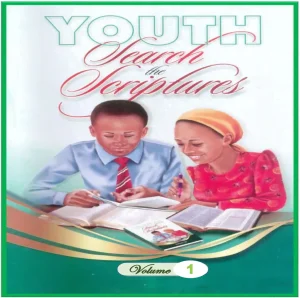
YOUTH STS LESSON 185 DECISIONS IN ADVERSITIES
Memory Verse
“And Ruth said, Intreat me not to leave thee, or to return from following after thee: for whither thou goest, I will go; and where thou lodgest, I will lodge: thy people shall be my people, and thy God my God: Where thou diest, will I die, and there will I be buried: the LORD do so to me, and more also, if ought but death part thee and me.”
(Ruth 1:16–17)
Text: Ruth 1:1–22
Orpah, Naomi’s other daughter-in-law, decided to return to her people and her gods. The plan and purpose of God are unsearchable and cannot be easily understood by the human mind. No wonder the Scripture says:
“O the depth of the riches both of the wisdom and knowledge of God! How unsearchable are his judgments, and his ways past finding out!” (Romans 11:33)
Out of the sixty-six books of the Bible, only two are named after women.
Question 1: Mention the two books named after women in the Bible.
The two books of the Bible named after women are Ruth and Esther.
Ruth was a young Gentile woman who changed her destiny through commitment and faith in the unfailing God. The book of Ruth reveals her character in the following ways:
-
Chapter 1 – Her commitment, consecration, and complete yieldedness to God (Ruth 1:16–18).
-
Chapter 2 – Her humility and hard work (Ruth 2:10–12).
-
Chapter 3 – Her virtuous and pure life (Ruth 3:10–11).
-
Chapter 4 – A divine reward for her great decision (Ruth 4:13, 17).
With her decision and devotion to God, determination, and diligence in labour, she stands out as a great gem to challenge youths today. She chose, cleaved to, and confessed the God of Israel to be her God.
What a challenge!
Elimelech and Naomi were a couple who left their home country, Bethlehemjudah, to Moab with their two sons in search of greener pastures during a famine. Ruth, a Moabitess, made a great decision to worship the God of Israel. She was a woman of faith and faithfulness.
Question 2: How can you summarise the character of Ruth from this book?
“Now it came to pass in the days when the judges ruled, that there was a famine in the land. And a certain man of Bethlehemjudah went to sojourn in the country of Moab, he, and his wife, and his two sons.” (Ruth 1:1)
It is always darkest before dawn. The story of Ruth took place during the period of the Judges — dark days in Israel when “there was no king in Israel: every man did that which was right in his own eyes” (Judges 21:25).
However, during these dark and evil days, some people still had faith in God. Whatever we face today is not greater than what the power of God can handle if we trust His Word.
“Many are the afflictions of the righteous: but the Lord delivereth him out of them all.” (Psalm 34:19)
THE SOJOURN OF ELIMELECH’S FAMILY IN MOAB
(Ruth 1:1–4; Hebrews 12:28–29; Psalm 2:12; Psalm 32:8; Proverbs 1:24–33)
During the time of the Judges, there was famine in Bethlehemjudah (verse 1). Because of this, Elimelech, Naomi, and their two sons (Mahlon and Chilion) went to the land of Moab to live. But the journey to Moab was either ill-advised or not well thought through. We are not told he sought God’s guidance.
Life’s journey requires divine leading and support. Taking decisions without God can be dangerous, destructive, and problematic.
Question 3: What do you understand by self-sufficiency?
“This know also, that in the last days perilous times shall come. For men shall be lovers of their own selves, covetous, boasters, proud, blasphemers, disobedient to parents, unthankful, unholy.” (2 Timothy 3:1–2)
Self-sufficiency is taking action or decision without first seeking God for direction. It is refusing to accept and recognise the need for His guidance.
Many youths today take rash decisions because of economic hardship, academic disruptions, joblessness, and insecurity. Without seeking God’s specific leading, they travel abroad in search of greener pastures, sometimes to their own detriment.
Christian youths should learn to seek God’s guidance when making decisions.
“I will instruct thee and teach thee in the way which thou shalt go: I will guide thee with mine eye.” (Psalm 32:8)
Question 4: How can we avoid spiritual famine in our lives?
“And though the Lord give you the bread of adversity, and the water of affliction, yet shall not thy teachers be removed into a corner any more, but thine eyes shall see thy teachers: And thine ears shall hear a word behind thee, saying, This is the way, walk ye in it…” (Isaiah 30:20–21)
Our attitude to God’s Word determines the level of spiritual strength we receive from Him. Through His Word, we find repentance, restoration, renewal, revival, and readiness for the rapture.
“…how ye turned to God from idols to serve the living and true God; And to wait for his Son from heaven…” (1 Thessalonians 1:9–10)
Elimelech’s family arrived in Moab with hope of survival. The two sons married Moabite women — Orpah and Ruth — and dwelled there about ten years (verse 4). However, tragedy struck: Elimelech and his two sons died.
The consequences of self-sufficiency in times of difficulty are enormous.
Question 5: What were the consequences of self-sufficiency on Elimelech’s family?
-
Elimelech was the first to die — he left Bethlehemjudah to avoid death but died in Moab.
-
His sons also died prematurely.
-
Their deaths left widows behind without anyone to care for them.
-
Their move to Moab led to marriage with a people God had forbidden Israel to associate with (Deuteronomy 23:6).
The warning from the Lord to His children today is to avoid self-sufficiency, which led to untold disaster in Elimelech’s family.
THE DECISION OF NAOMI TO RETURN TO BETHLEHEM
(Ruth 1:6–15; Luke 15:11–24; Exodus 2:24–25; 3:9–10; Genesis 21:1–7; Judges 13:1–25; 1 Samuel 1:9–20; Luke 1:23–25, 67–80; Titus 2:1–5)
“Then she arose with her daughters in law, that she might return from the country of Moab: for she had heard… how that the Lord had visited his people in giving them bread.” (Ruth 1:6)
Naomi received news of God’s visitation and took the right decision to return to Bethlehem. She had the courage to return despite her loss and shame.
Question 6: In what areas are we expected to take decisions in life?
We are expected to take godly decisions in all areas of life. It takes faith, courage, and prayerfulness to make the right choices.
-
Salvation: Accepting Jesus Christ as Lord and Saviour — the greatest decision in life (Revelation 3:20).
-
Restoration: The backslider must return to God with a penitent heart, as the prodigal son did (Luke 15:18).
Naomi truthfully told her daughters-in-law the cost of following her to Bethlehem Judah. She wished them well and prayed for them (verses 8–13).
Orpah decided to return to her people and idols — after which nothing was heard of her again.
Ruth, however, cleaved to Naomi — and history was made.
Question 7: In your own words, how would you describe Naomi in our text?
Naomi was a woman who faced great challenges yet maintained good character and conduct. She:
-
Had faith in God and loved His Word.
-
Influenced others positively.
-
Had courage and encouraged others.
-
Maintained sound scriptural standards.
-
Was patient, caring, and loving.
-
Lived a pure life and discouraged sin.
-
Was truthful and faithful.
-
Served as Ruth’s mentor, teacher, and counsellor.
All these attributes are worthy of emulation by Christian youths today.
THE DEVOTION OF RUTH TO CLEAVE TO NAOMI’S GOD
(Ruth 1:14,16–18; Deuteronomy 4:4; 10:20; 11:22; 13:4; Daniel 1:8,17–20; Acts 11:22–23; Romans 8:31–39)
Although Orpah returned to her people, Ruth followed Naomi and her God. Her decision transformed her life from being a descendant of a cursed nation to becoming an ancestor of Jesus Christ (Ruth 4:18–22; Matthew 1:4–6).
God wants all youths to cleave to Him with purpose of heart (Acts 11:22–23).
Ruth’s response showed determination and devotion:
“Intreat me not to leave thee… thy people shall be my people, and thy God my God.” (Ruth 1:16–17)
She chose Naomi’s people unconditionally.
Question 8: What are the benefits of determination to a Christian youth?
“But Daniel purposed in his heart that he would not defile himself…” (Daniel 1:8)
The benefits of determination include:
-
Focus and concentration on goals.
-
Success despite difficulties.
-
Faithful devotion to God.
-
Development of character and transformation into a great asset.
-
God’s favour and goodness.
-
A challenge to the lazy and indolent.
-
Promotion and progress in life.
Examples of determined youths: Joseph, Ruth, Esther, David, Daniel, and his friends.
When Naomi saw Ruth’s steadfastness, she stopped persuading her (verse 18). Together, they journeyed to Bethlehem, where they were received joyfully (verse 19).
Naomi, however, asked to be called Mara because she felt bitter about her loss (verse 20) — a wrong attitude Christian youths should avoid.
Those in God’s will are always victorious despite challenges. Instead of murmuring, we should pray and trust God.
“And we know that all things work together for good to them that love God…” (Romans 8:28)
Conclusion
We learn that decision, determination, and devotion to a right cause bring success and fulfilment in life.
Those who decide for Jesus today will never regret it — in life or in eternity.
Christian youths must know that determination is a key to all-round success, and deep devotion to God leads to deep spiritual maturity.

